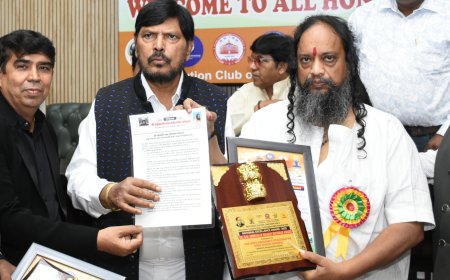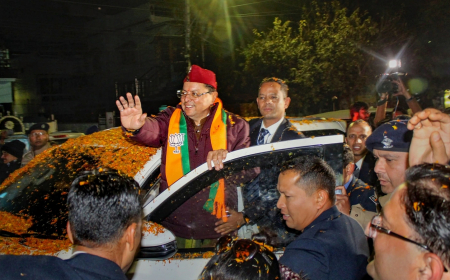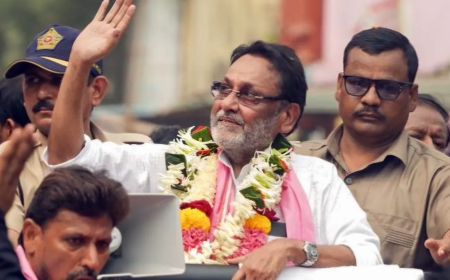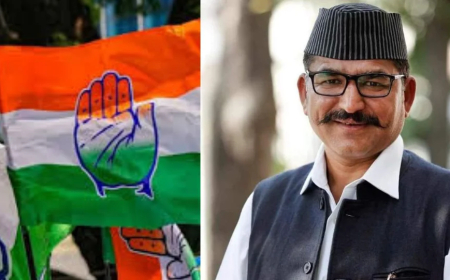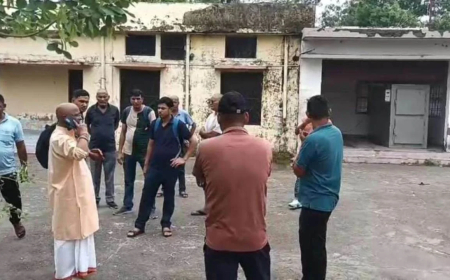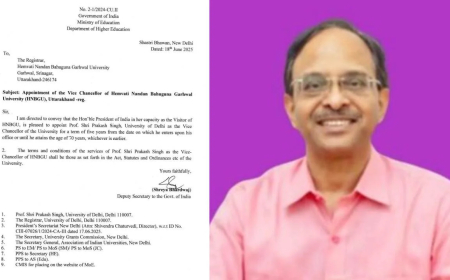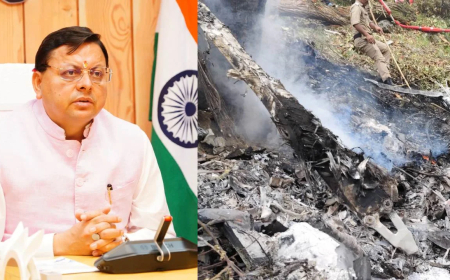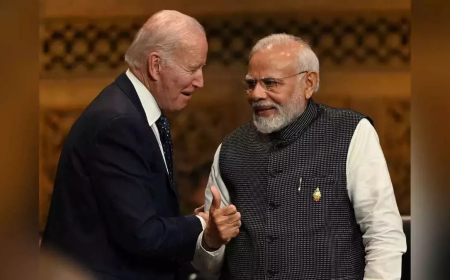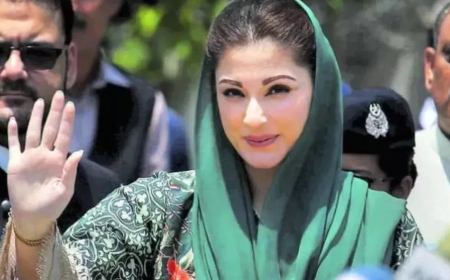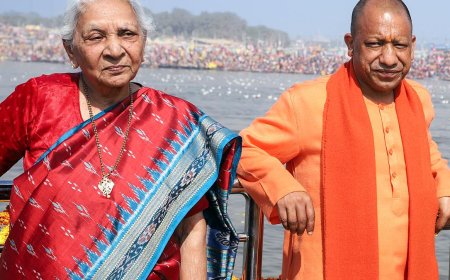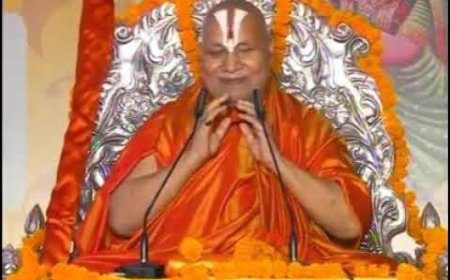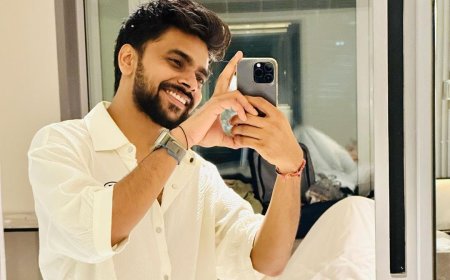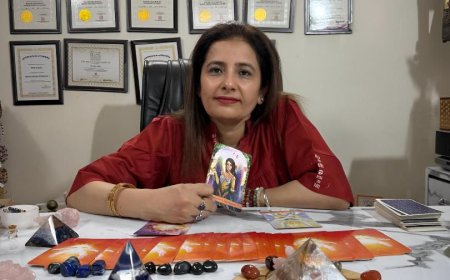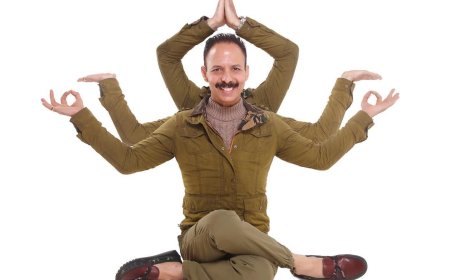The Unvarnished Truth of Public Relations: Prashant Golecha on Authenticity and Karma
Prashant Golecha, a veteran PR consultant, unveils the essence of public relations as more than publicity—it's about genuine communication, enduring relationships, and the karmic consequences of integrity in the media world.

For over twenty years, Prashant Golecha has been a significant force, meticulously shaping public narratives and guiding perceptions within the often-turbulent waters of the entertainment industry. When asked about the most defining chapter in this extensive career, he speaks with a humble candour, acknowledging that his journey has been a continuous process of skill refinement and growth, with many moments contributing to his evolution. Yet, a particular instance stands out with crystalline clarity: the moment Anuj Saxena placed his trust in him for personal public relations work. This, he reveals, was the true genesis of his distinguished career in public relations, marking the point where his professional trajectory truly began to ascend. It was a foundational trust that paved the way for subsequent, equally pivotal collaborations, such as the formidable experience of working with the esteemed producer Rajan Shahi on iconic shows like Sapna Babul Ka… Bidaai, which then naturally flowed into the enduring phenomenon that is Yeh Rishta Kya Kehlata Hai. Beyond these enduring sagas, his path led him to contribute to the narratives of other television behemoths, including Mahadev, Mahabharat, the immensely popular Bhabi Ji Ghar Par Hai!, and the contemporary sensation Anupamaa. Each of these projects, he reflects, represents a profoundly meaningful chapter, contributing invaluable lessons and milestones to his professional development. The journey also encompassed the exhilarating challenge of handling two feature films, Aloo Chaat, starring Aftab Shivdasani and Aamna Shariff, and Chase, featuring Anuj Saxena and Udita Goswami. Furthermore, his professional zenith was undoubtedly touched by managing the public relations for Red Chillies' television ventures, notably Ghar Ki Baat Hai, which marked Juhi Babbar's much-anticipated TV debut, and Simi Garewal’s discerning talk show, India's Most Desirable. These collective experiences underscore a career built on diverse, impactful projects, each cementing his reputation.
When reflecting on the profound insights gleaned over these two decades concerning the formidable power of perception, Prashant Golecha offers a perspective that is both pragmatic and deeply insightful. He articulates that perception, much like a living entity, is inherently fluid and dynamic. It possesses an inherent capacity to shift and evolve, its trajectory largely dictated by the magnitude and success of the projects one chooses to align with. In the exacting and often capricious world of the media industry, he asserts, an individual's professional value is inextricably linked to the calibre and demonstrable impact of their work. This isn't merely about achieving widespread visibility; rather, he stresses a more nuanced understanding: true public relations, in its most effective form, transcends mere publicity. It fundamentally hinges upon the bedrock principles of clear, unambiguous communication, an unyielding and genuine intent guiding every interaction, and the projection of an authentic, resonant energy. When these critical elements coalesce and align in perfect synchronicity, the power of perception, he concludes, transforms into an extraordinarily potent force, working unequivocally and powerfully in one's favour, shaping narratives that resonate truthfully and enduringly.
On the subject of competition, a common talking point in any industry, Prashant Golecha maintains a remarkably zen-like and unperturbed stance. He emphatically asserts that the vast landscape of the public relations sector offers an abundance of opportunities for everyone, suggesting a philosophy of abundance rather than scarcity. There’s a distinct lack of concern in his voice when he dismisses the notion of dwelling on those who have departed from his agency or those clients who might have been enticed away by the siren call of discounts offered by smaller, less established PR firms. For him, the singular focus remains steadfastly on the uncompromised quality of service and the meticulous manner in which his team represents their esteemed clientele. He draws an apt parallel to industry titans like Yash Raj Films or Dharma Productions, noting that these stalwarts do not fritter away their energy fretting over smaller players; their unwavering attention is dedicated solely to the pursuit of excellence. He acknowledges the persistent efforts of some agencies to directly solicit his clients, but he views any defection to a cheaper alternative as a reflection of the client's own values rather than a deficit in his agency's worth. He holds an unshakeable conviction in his team’s capabilities, highlighting their proven track record of transforming absolute newcomers into widely recognized and respected names. His frank assessment is that "mediocre PR attracts mediocre clients," and those who ultimately choose to depart simply aren't in alignment with the core values and standards his agency upholds. He even suggests that potential clients "need to deserve what we offer; it’s not for everyone," indicating a selective approach to partnerships. The idea that some actors express interest but never commit leads him to believe they may not be the right fit for their distinctive approach. Ultimately, he posits that genuine relationships and unwavering integrity are the true currencies in this business. This isn't just a professional philosophy; he views it through the lens of karma, believing implicitly that one cannot mistreat those who provided support and expect a smooth professional journey. He shares anecdotes of former clients who, having left, often return or concede that they genuinely miss the unique essence of his agency. There’s, he says, "a certain magnetism to our energy," even joking about their "hand-beaten coffee" being legendary, implying that the entire atmosphere fostered by his team is one of positive rejuvenation. Actors, he claims, feel refreshed just by being in their presence, underscoring the intangible "vibe" they cultivate. He dismisses criticism from smaller PR firms calling his methods "old school" with a laugh, pointing to his loyal client base and vast industry goodwill as irrefutable proof of his enduring efficacy.
Among the myriad professional interactions, Prashant Golecha cherishes certain client experiences as particularly gratifying. He recounts the immense pleasure of collaborating with a roster of genuinely wonderful professionals. This esteemed list includes names like Eijaz Khan, Somy Ali, Sumbul Touqeer, Arjun Bijlani, Arjan Bajwa, Delnaaz Irani, Rukhsar Rehman, Nivedita Basu, Munisha Khatwani, Himanshu Malhotra, Shubhangi Atre, Shivin Narang, Sharad Malhotra, the culinary maestro Harpal Singh Sokhi, Rajesh Kumar, Rajniesh Duggal, Chitra Vakil Sharma, Rahul Sharma, Aniruddh Dave, the producing powerhouses Rajan Shahi, Binaiferr Kohli, Prateek Sharma, Parth Shah, Sunjoy Waddhwa, Rahul Kumar Tewary, and the dynamic duo Ravi Dubey and Sargun Mehta. Also, Hrishikesh Pandey, Rinhee Suberwal, and Pooja Seth. He characterizes each of these individuals as respectful, profoundly collaborative, and an absolute delight to engage with professionally. Beyond the glitzy world of actors, his agency proudly represents a diverse portfolio of non-actor clients, encompassing astrologers, healers, restaurateurs, and spa owners. A deeply fulfilling facet of his work, he reveals, is the transformative journey of helping lesser-known individuals and nascent brands burgeon into recognized and influential entities. Witnessing their evolution and standing steadfastly by his talents through both triumphs and tribulations represents one of the most profoundly rewarding aspects of his professional endeavour.
However, the path of a PR consultant is not perpetually paved with success stories and harmonious collaborations; moments of significant friction and disappointment are an inherent part of the journey. Prashant Golecha candidly shares some of these more challenging experiences, painting a picture of the darker undercurrents that can exist in the industry. He recalls a particular top star who not only defaulted on payments but, shockingly, even resorted to begging for money—an individual now, ironically, facing considerable professional struggles. He speaks of encounters with individuals exhibiting "toxic relationships with money," people who brazenly manipulate situations for their own convenience, irrespective of ethical considerations. He laments cases where actors' careers have been severely hampered by overbearing family control. One particularly bewildering incident involved an actor who claimed to require PR assistance specifically to meet alimony obligations, only to ghost the agency later—a situation made even more ironic by the revelation that this same actor was concurrently involved in an affair with one of Golecha's other clients. He recounts instances of providing steadfast support to clients during periods of crisis, only to be subjected to their backbiting and negative remarks once they regained success or, conversely, when their fortunes waned. The stark reality of a Bollywood actor who feigned ignorance of Golecha after achieving significant stardom, and another who, despite publicly flaunting a lavish lifestyle and dating a superstar’s ex-wife, conspicuously refused to settle outstanding dues, are etched in his memory. Such experiences have led him to pragmatically "cut such people out of my space," maintaining a cordial yet distant relationship, firmly believing that "Karma will handle the rest." He powerfully posits that if his agency served as "the roots in someone’s career" and they chose to abandon that foundation when the "fruits appeared," it signifies a profound disconnection from their very origins. "Fame without values," he states unequivocally, "is an illusion." He expresses his exasperation at how, despite life's often harsh lessons—especially evident in 2025—many still fail to grasp this fundamental truth: that material possessions are ephemeral. His strong counsel is to never cheat or mistreat genuine professionals, asserting that kindness should never be mistaken for weakness. The universe, he stresses, is an ever-vigilant observer, and "Karma doesn’t wait for another life—it’s active now." He acknowledges encountering actors who lack basic courtesies or project their life frustrations onto his team. While they handle such situations with utmost politeness, they are prepared to take a firm stand if circumstances escalate. He expresses genuine astonishment at the naivety of some actors who, despite having a long-standing relationship and working closely with his agency, blindly believe external whispers, indicating a troubling lack of fundamental principles in life, relationships, and professionalism, which he believes will invariably lead to a bleak future devoid of a reality check.
Addressing the disheartening realities of disloyalty and client attrition, Prashant Golecha’s perspective is one of unwavering confidence and self-assuredness. He asserts that if a talent painstakingly nurtured by his agency chooses to depart for what he dismissively terms a "Tom, Dick, or Harry" agency, the loss is unequivocally theirs, not his. He emphasizes that his team offers far more than conventional public relations services; they function as holistic motivators, adept crisis managers, and skilled personality builders, crafting narratives that resonate with profound depth. Their unique approach, he declares, possesses a distinct "soul" that is simply beyond replication. He acknowledges that some former clients may engage in bad-mouthing while masquerading as friends, but he takes such actions in stride, opting to simply "move on." Maintaining a naturally friendly demeanour, he nonetheless upholds stringent professional boundaries, choosing to focus his energy and efforts on those who genuinely appreciate and value the calibre of their work.
His gratitude for certain clients shines through when he mentions Jasmin Bhasin. He highlights her exemplary professionalism, noting that even during her stint in Bigg Boss, a period of intense public scrutiny, she ensured her PR payments were handled punctually and consistently transferred on time. This, he says, "speaks volumes about her integrity." Somy Ali also receives high praise, not only for her consistent advance payments but for possessing "common sense which is not common," and for being a truly "humane human being"—qualities he deeply admires. He expresses profound appreciation for Charul Malik, who, through her genuine recommendation, introduced them to both Binaiferr Kohli and Somy, demonstrating that such authentic gestures remain etched in his memory. He cherishes the foundational value of relationships and applauds Charul for her consistent and generous recommendations. Arjun Bijlani is commended for his authenticity and laid-back demeanor, while Rajesh Kumar and Delnaaz Irani are affectionately noted for their kindness in "pampering" his dedicated team.
When queried about any desire to reconcile with former clients or actors, Prashant Golecha unequivocally states that "there’s no malice on my side." His singular focus remains on delivering exceptional work, not on accumulating a circle of friends. He dismisses any past misunderstandings or backbiting as "their story," affirming his unwavering professionalism throughout. He acknowledges being labelled "arrogant" by some, but counters that "those who trusted me never regretted it." He observes that a few actresses who departed his agency continue to struggle to find their footing, attributing this to the lack of genuine guidance from their new teams, which ultimately stalled their growth. He makes it clear that he doesn't actively pursue anyone; if individuals choose to conjure up misconceptions about him, that too is "their story." His philosophy is to live firmly in the present and gracefully release the past, adhering to the principle of "Raat gayi, baat gayi" (let bygones be bygones) in both his personal and professional life. He asserts that those who have chosen to part ways have made their choice, and he views it as "no big deal," especially given that "plenty of actors have never learnt what loyalty is and change PR's like shirts." He believes life is fundamentally about navigating personal and professional relationships with the right attitude, and actors with "mediocre minds or herd mentality never stay with us."
Prashant Golecha’s stance on client defaults is unequivocal and delivered with a palpable sense of conviction. He issues a direct appeal to past clients: "please clear your dues." He firmly states that taking professionals for granted is unacceptable, and that the energy one puts out inevitably returns. While his agency extends help to many in need, he asserts that recurring excuses are a stark reflection of the client’s character, not his own. He views PR not as an expense, but as a critical investment, and counsels that if one cannot afford it, they should not commit. Integrity, he stresses, is paramount. He challenges the notion that celebrities should be exempt from ethical conduct, questioning why a security guard or an Ola driver can operate with ethics, but some public figures cannot. He recounts the disheartening experience of actors whose spouses undermined his agency’s work, while the actors themselves lacked the courage to defend them. It’s particularly saddening, he notes, when those who once desperately needed his assistance turn opportunistic as their fortunes change. His team operates on a deeply ingrained value system: "if even a rupee is owed, food doesn’t taste right until it’s repaid." He shares an incident where a defaulter’s referral led him to work with an actress on credit based on a sob story, only for her to also fail to pay despite ample opportunities. He expresses genuine bewilderment at how such individuals can "sleep peacefully," believing that unethical conduct isolates one from those who embody integrity. Money, he concludes, is energy, and if it cannot be given with love, it must at least be given with respect and fairness. While acknowledging an actor’s right to change PR, he insists on maintaining professional courtesy and the right attitude. He describes another instance where an actor, owing money and in a troubled marriage, sought him out in a distressed state. Despite pacifying him, the actor never paid and was later found to have borrowed from other actors, now struggling professionally while maintaining a false facade of a happy marriage. He observes that numerous actors, despite immense potential, have failed to climb the ladder due to a detrimental professional attitude and conduct. He cites a top Bollywood actor who referred a struggling colleague, whom his agency helped on credit, only for that actor to vanish without paying, and now also struggles. Golecha reiterates that these defaulters often end up as professional failures, seemingly oblivious to the gravity of their actions. He shares the story of an actress who secured a film through his agency’s reference, expressed gratitude, then quietly moved to a lesser-known PR firm, feigning she had no PR. He laments that this actress, who could have been recommended for another film, now sits jobless, having prioritized short-term gain over long-term relationships. When clients depart, his team is the last to react, reflecting his work-oriented ethos and his belief that their agency is, simply put, "the best."
Finally, Prashant Golecha speaks with immense pride and affection about his team—Srabanti Chakrabarti, Mansi Dama, Yashika Shah, Shrinkhla, Triparna Mahesh, Anjuri Nair, and Aditi Chandra. He describes them not merely as colleagues but as extensions of his own values, a cohesive unit that operates with mutual respect. They are, he states, his "backbone," each contributing sincerity, talent, and unwavering dedication. He is profoundly proud of the bond they share, emphasizing that together, they transcend mere client management; they collectively "shape narratives and uplift energies." This, he declares, is their "collective magic." He believes that one must truly "deserve such a loving and positive team," implying that not every actor is a suitable fit for their professional ecosystem. He asserts that actors who have placed their absolute trust in his team’s hard work, intelligence, and vision have consistently achieved "fantastic results." To all his existing clients, he extends a heartfelt message: to genuinely value and trust their hard work, presence of mind, intelligence, maturity, and professionalism, assuring them that they will "never be disappointed." His unwavering commitment is evident in his 24/7 availability. He also makes a direct appeal to journalists, affirming his team’s helpful nature and professional pitching, urging them to respond in a timely manner and never avoid them. His possessive protectiveness towards his team is palpable: "I am not going to listen to crap stuff about my staff." He confidently declares their collective excellence, acknowledging that they are all "still learning and innovating regularly," recognizing that there is "no end to learning and growing, understanding the latest trends in PR and reinventing ourselves and providing the right guidance to all clients." His overarching life philosophy, as he succinctly puts it, is to "live and let live." He approaches each day deliberately, working at his own measured pace, focusing intently on delivering results that are firmly rooted in uncompromising integrity. He places unwavering trust in himself, his dedicated team, and his valued clients, believing that those who are truly aligned with their principles consistently witness outcomes that transcend all initial expectations.









